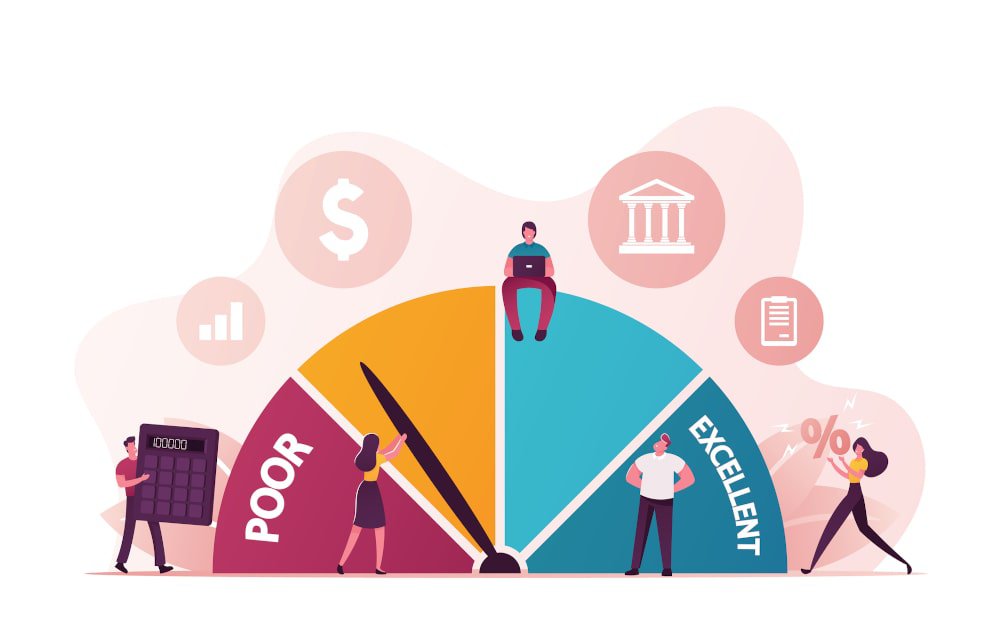How Bad Credit History Affects your Mortgage Options

Introduction:
When obtaining a mortgage from a bank or institutional lender, it’s no secret that a borrower’s credit history is one of the primary factors that is evaluated (amongst a range of others). But how exactly does a poor or bad credit history impact a homeowner’s or homebuyer’s choice and availability of mortgage options? And will you be able to get a bad credit mortgage at all?
What is Credit History?
A person’s credit history is comprised of a few variables. These variables all get combined into one score between 300 and 900. In general, a score above 680 or 700 means that you have managed your credit well in the past and are less of a flight risk when it comes to paying back your debts payments on time, a factor that contributes a strong credit rating. A score in the 300 to 600 range is more of a cause for concern amongst lenders.
The factors that go into your credit history, and subsequently your score include:
- History of on-time payments: When you make payments on existing loans on time and as scheduled, those lenders report favourably to credit agencies which bolsters your score. On the contrary, missed or overdue payments and/or any bankruptcies would bring down the score. This is often the most important piece of your credit history.
- Utilization Rates: The amount of debt outstanding as a percentage of the total credit available to you is a second important factor. Ideally, you should aim keep you credit card balances and other revolving credit balances at 30% or less of your total credit availability. As an example, if your total credit limit (availability) is $5,000, then aim to cap off your credit card bills at $1,500.
- Length of Credit History: The longer that you have had certain accounts and credit tradelines open, the better it is for your credit history, provided that you have been making your monthly payments on time. A long and positive credit history demonstrates a track record of successfully drawing down and repaying your debts on time.
- Frequency of New Credit Requests: When a lender performs a hard check on your credit, your score has an adverse impact. Therefore, if you have applied for credit recently and shopped around with various lenders who did hard checks, then you may find that your score declined despite other factors staying stagnant. The rules for this are slightly different when it comes to pulling your credit for mortgage related purposes.
- Type of Credit: Instead of just having a credit card, it is advisable to have different types of credit tradelines such as a line of credit, mortgage, credit cards, etc. Note that this is subject to individual borrower feasibility.
How does this impact my mortgage options?
Now that we have explored what goes into a credit score, a fair question to ask at this point would be “What are the potential implications to you as a borrower?”. In general, the higher your credit score and the stronger your credit history, the more options you will likely have available to yourself as a borrower, and the better your interest rate will be. This is because at higher credit scores, borrowers tend to pose a lower risk of default to the lender. On the other hand, a lower score poses a higher risk of default. For this reason, lenders charge a higher rate of interest to borrowers with bad credit in order to compensate themselves for the additional risk they are taking on.
Beyond the interest rate considerations, different types of lenders also have different risk parameters. A prime “AAA” institutional lender, like a major bank or a monoline lender, normally looks for “high-quality” borrowers (scores of above 680+) and may consider borrowers with scores between 600 and 679 as long as other parts of the application are strong. On the other hand, borrowers with scores below 600 may have to seek out alternative lenders, such as trust companies, credit unions, or even private lenders, as prime lenders generally do not have the risk appetite to lend to borrowers with such profiles.
Below is a brief summary of the characteristics of lenders:
Prime Lenders:
- Credit Scores: 700 – 900; 600 – 700 on a selective basis
- Mortgage Rates: Low
- Types: Major chartered banks and monoline lenders with strict lending requirements
Alternative Lenders:
- Credit Scores: 500 – 700
- Mortgage Rates: Medium
- Types: Financial institutions that are specifically targeted to borrowers with sub-optimal credit scores and/or histories such as trust companies, and credit unions
Private Lenders:
- Credit Scores: Mainly under 600
- Mortgage Rates: High
- Types: Private companies such as a MIC (Mortgage Investment Corporation), a private mortgage fund, or individual investors
What can I do to improve my chances?
If you find yourself outside of the parameters of the prime lenders, we have some great alternative lenders that we work with. Also, there are several steps that you can take to improve your credit score so that you can qualify for more competitive lower rates with lenders down the road.
- Pay off your debts as they come due each time. Building up a record of this over time has a big impact on your credit score. If you cannot pay debts in full, at least make the minimum payments on time and try to keep your balances below 30% of your credit limit.
- Take on a new credit facility if possible. An additional line of credit that you actively use and repay each month will give you bonus points for your credit score! However, prior to qualifying for a mortgage, you may be required to pay off this debt depending on your debt-to-income ratios.
- Don’t cancel your oldest credit card. This builds up your credit history and gives you a longer track record of successful repayments.
- Avoid applying for credit at frequent intervals. As lenders perform hard checks on your credit history, your credit score will be brought down. However, checking your own score does not impact your credit as it is considered a soft pull.
- Try to stay within the 30% utilization rate or below. Utilizing over 30% of the total credit limit you have available can be a dampener on your score. Alternatively, staying under 30% indicates sound credit management to lenders.
Final Remarks
Overall, credit histories are a highly important variable when pursuing mortgage applications . A strong credit history has the potential to facilitate a lower rate from lenders, better mortgage terms, as well as give you a far greater range of options when selecting what lenders you close a loan with.





